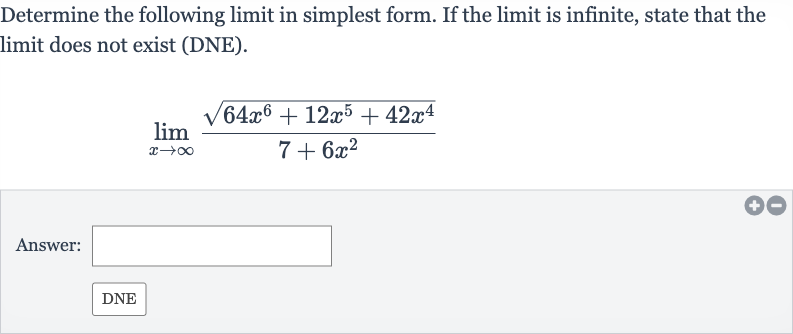Full solution
Q. Determine the following limit in simplest form. If the limit is infinite, state that the limit does not exist (DNE).Answer:
- Factor Out Highest Power: We are given the limit expression . To simplify this, we will first factor out the highest power of in the numerator inside the square root.
- Factor Out : Factor out from the square root in the numerator to simplify the expression inside the square root.
- Take Out: Now, we can take out of the square root, since .
- Divide by : Next, we will divide both the numerator and the denominator by , the highest power of in the denominator.
- Simplify Expression: Simplify the expression by canceling out from and simplifying the square root as approaches infinity.\frac{x^{\(3\)}}{x^{\(2\)}}\left(\sqrt{\(64\)+\frac{\(12\)}{x}+\frac{\(42\)}{x^{\(2\)}}}\right)\div\left(\frac{\(7\)}{x^{\(2\)}}+\(6\right) = x\left(\sqrt{+\frac{}{x}+\frac{}{x^{}}}\right)\div\left(\frac{}{x^{}}+\right)
- Approach Infinity: As approaches infinity, the terms , , and in the expression will approach . =
- Find Limit: Now we have a simplified expression where we can easily find the limit as approaches infinity.
- Find Limit: Now we have a simplified expression where we can easily find the limit as approaches infinity.The limit of as approaches infinity is infinity, which means the limit does not exist (DNE).
More problems from Power rule
QuestionGet tutor help
QuestionGet tutor help
QuestionGet tutor help
QuestionGet tutor help
QuestionGet tutor help

